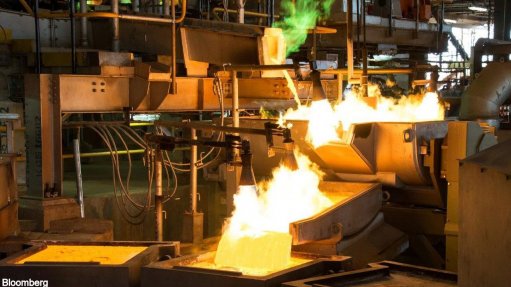Chinese investment underpins Africa’s mining sector


RESISTANCE REPORTED The resistance to Chinese-funded infrastructure developments in Zambia is no different from any other mining jurisdiction
China has played an important role in developing the mining industries of Africa’s emerging nations, such as Zambia, where the Asian country’s investment has particularly helped infrastructure development, an important precursor needed for mining, says African Mining Network chairperson Yolanda Torrisi.
“In Zambia, project developers and industry representatives are seeing the results from their relationship with Chinese investors. Among the most notable of investments in infrastructure is China’s support with regard to the construction of the Tazara railway from the Zambian Copperbelt to the Indian Ocean through Tanzania, which has been operating for more than 40 years,” Torrisi notes.
Zambia public university Copperbelt University vice chancellor Naison Ngoma says that, to date, the railway line has played a vital role in facilitating the importing and exporting of goods.
During an interview in June with China’s State-run press agency New China News Agency, he urged Zambia and other African nations to use the first China–Africa Economic and Trade Expo to gain tangible benefits.
More than 10 000 delegates attended the inaugural biennial event that month in Changsha, with more than 1 000 of those being from Africa, along with additional participants who took part online.
China’s Ministry of Commerce and the People’s Government of Hunan Province hosted 53 African countries at the expo, titled Win-Win Cooperation for Closer China-Africa Economic and Trade Partnership.
Networking at the expo has allowed for connections between miners, investors, jewellers, producers and distributors, besides other professions.
During an interview in July with the same news agency, mining body the Association of Zambian Women in Mining secretary Grace Njapau acknowledged Zambia and China’s bilateral ties, stating that the expo was already producing the desired results in terms of trade partnerships and investment.
China has been implementing a large number of major projects in rail transit, ports, aviation and electric power, which have facilitated the entry of Chinese technologies, equipment and the growth of internationally high standards and services in Africa.
The value of China as a source of funding for infrastructure investment should be acknowledged and encouraged to ensure that more vital mining projects are commissioned and developed into sustainable operations, says Torrisi.
However, China’s infrastructure funding in Africa is not without criticism, with some arguing that there is growing resentment towards the Chinese presence in Zambia.
Torrisi says to create a better relationship between Zambia and China, the Zambian government is encouraged to set out its clear and defined charter of investment protocols for foreigners, agreed to by investors in the host nation.
According to an article by German international broadcaster DW, since Chinese investment is accompanied by an influx of Chinese citizens, “many Zambians are now responding with a resounding ‘no’ to these seeming development projects”.
There are also countless news reports about China wanting to take over the country’s State-owned power utility Zambia Electricity Supply Corporation, which are not improving locals’ sentiment.
“Zambia has [neither] offered any State-owned enterprise to any lender as collateral for any borrowing, nor does it ever have plans to do so,” stated Economics Association of Zambia president Dr Lubinda Haabazoka in response to a Bloomberg Businessweek article published in January this year.
He also stressed that Zambia’s debt to China was $3.1-billion, about one-third of its $9.51-billion in external debt in the third quarter of last year – “below the internationally agreed threshold of 40%”.
Torrisi notes that, sometimes, protest groups are supported by powerful lobbyists with their own agendas.
“This is not a unique situation for Africa and not a unique situation for Zambia. Groups create their own rumours. Let’s not let them set the narrative here. China’s investment dollars matter and they can help Zambia build its minerals wealth. Zambia needs to set the investment infrastructure it wants for its country, people and mineral wealth.
“Rumour mills produce outcomes for the people who start them. But the momentum we need on the continent is growth, not stirred-up bigotry,” she stresses.
Torrisi emphasises that Zambia needs to gather as much assistance and expertise as possible from all sources to grow its mining industry and have mining play a greater role in the country’s economic growth.
The resistance to Chinese-funded infrastructure developments in Zambia is no different from any other mining jurisdiction, Torrisi says.
“Across the world, community groups are opposing sensible developments backed by a range of countries, despite their clear economic and social benefits,” she adds.
Last year, Chinese investment in Africa grew 20% to $204.2-billion, compared with 2017 figures. Eight African countries now also include the renminbi, the official currency of the People’s Republic of China, in their foreign exchange reserves.
“Let’s acknowledge the importance of Africa’s relationship and keep on building reciprocal relationships for the benefit of the continent. Let’s not let fear win or rumours gather pace. After all, investments in infrastructure and projects are a cornerstone to economic and community development, and the success of our mining sectors, no matter their source,” concludes Torrisi.
Comments
Press Office
Announcements
What's On
Subscribe to improve your user experience...
Option 1 (equivalent of R125 a month):
Receive a weekly copy of Creamer Media's Engineering News & Mining Weekly magazine
(print copy for those in South Africa and e-magazine for those outside of South Africa)
Receive daily email newsletters
Access to full search results
Access archive of magazine back copies
Access to Projects in Progress
Access to ONE Research Report of your choice in PDF format
Option 2 (equivalent of R375 a month):
All benefits from Option 1
PLUS
Access to Creamer Media's Research Channel Africa for ALL Research Reports, in PDF format, on various industrial and mining sectors
including Electricity; Water; Energy Transition; Hydrogen; Roads, Rail and Ports; Coal; Gold; Platinum; Battery Metals; etc.
Already a subscriber?
Forgotten your password?
Receive weekly copy of Creamer Media's Engineering News & Mining Weekly magazine (print copy for those in South Africa and e-magazine for those outside of South Africa)
➕
Recieve daily email newsletters
➕
Access to full search results
➕
Access archive of magazine back copies
➕
Access to Projects in Progress
➕
Access to ONE Research Report of your choice in PDF format
RESEARCH CHANNEL AFRICA
R4500 (equivalent of R375 a month)
SUBSCRIBEAll benefits from Option 1
➕
Access to Creamer Media's Research Channel Africa for ALL Research Reports on various industrial and mining sectors, in PDF format, including on:
Electricity
➕
Water
➕
Energy Transition
➕
Hydrogen
➕
Roads, Rail and Ports
➕
Coal
➕
Gold
➕
Platinum
➕
Battery Metals
➕
etc.
Receive all benefits from Option 1 or Option 2 delivered to numerous people at your company
➕
Multiple User names and Passwords for simultaneous log-ins
➕
Intranet integration access to all in your organisation



















